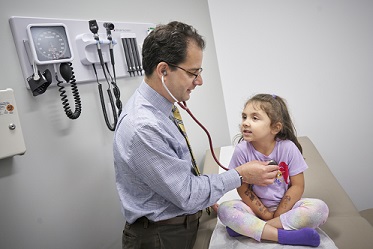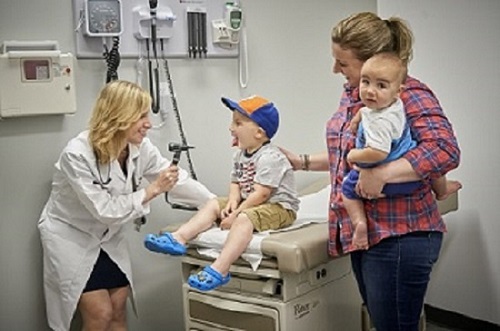At the beginning of intern year, all Pediatric residents are assigned to one of our primary care offices, which are located in the surrounding communities. Residents will spend several sessions each week of their Y block at their assigned continuity clinic. Even in our current block-format scheduling system, residents are able to establish a true continuity panel of patients. Once we move to X+Y in June 2025, we anticipate the continuity to improve even more! Consistent placement at a continuity site also helps residents build a strong relationship with their patients, preceptors, co-residents and office staff. Continuity clinics becomes our residents' home away from home.
We are proud to note that our Stony Brook Pediatrics primary care offices have achieved Patient-Centered Medical Home (PCMH) Level 3 recognition from the National Committee for Quality Assurance (NCQA). PCMH is a model of care that puts patients at the forefront, improves quality of care and the patient experience, while reducing health care costs. Residents are an integral part of the PCMH model. They have the opportunity to work with social workers, case managers, and other community partners, which are all aspects of the medical home.


In general in continuity clinic, residents manage their own patient panels under the supervision of a general pediatric attending preceptor. The premise of continuity clinic has remained the same - residents are responsible for all aspects of patient care, including following up on their patients' labs, returning phone calls, completing forms, and patient billing. This model encourages residents to develop a unique longitudinal relationship with their patients and families over the course of their residency and offers a true representation of ambulatory pediatric care. It also fosters independent learning and teaches resident physicians the importance of taking ownership for the acute care and well-child care of their patients. Residents manage pediatric patients of all ages, across a range of diagnostic complexity. Residents care for patients with acute and chronic illnesses, and provide care for children of all developmental levels. They learn to refine anticipatory guidance with regard to their patient’s and family’s future health care needs, and educate them and their families on the necessities for normal growth and development, as well as social, emotional, and nutritional needs.
Residents also recruit patients from the Newborn Nursery, Neonatal Intensive Care Unit, Ward, and other units to follow up in their continuity clinic after hospital discharge. Our EMR system provides easy access to both inpatient and outpatient encounters, labs, and radiologic studies, which allows the physician to have his or her patient’s comprehensive medical record readily available. Parents are comforted by the knowledge that their physician in the office already knows their child’s history, making the transition from the hospital to the community a smoother process.

A resident who desires a career in outpatient primary care has the opportunity to additionally complete our two to four-week Primary Care Elective, which consists of full-day primary care pediatric experiences throughout the entire rotation. Residents also customize their elective schedule to focus on populations to which they would like more exposure by selecting from among all of our Stony Brook Children's primary care sites and the many private practices within our community network.
All our continuity sites participate in the nationally recognized Reach Out and Read Program and help promote early literacy by offering new, age-appropriate books at well child visits. This program aims to promote increased communication between parents and their children from early infancy years to encourage brain development and early literacy. We have incorporated both bilingual books and books with racially diverse characters that are better representatives of the communities in which we practice.
Stony Brook Children's is committed to providing the best possible care to the children of Suffolk County and their families. Residents have patients booked with them right from their first session in continuity clinic. Residents serve as the pediatrician for families throughout their three years of training. From an educational perspective, residents have protected time during their Resident Continuity Practice sessions for specific primary care curriculum teaching, which happens right at the continuity clinic. We discuss diagnoses and concepts essential to the care of children and young adults, ranging from GERD to Autism Spectrum Disorder. While residents learn the most from being with patients, the educational curriculum provides them with illness scripts, combined with pearls from the bedside shared by their preceptors, to empower residents to better educate their patients and their patients' families.
Upon completion of residency training, our residents are well-prepared to enter into Primary Care, Academia, or private practice, as well as move on to fellowship training.